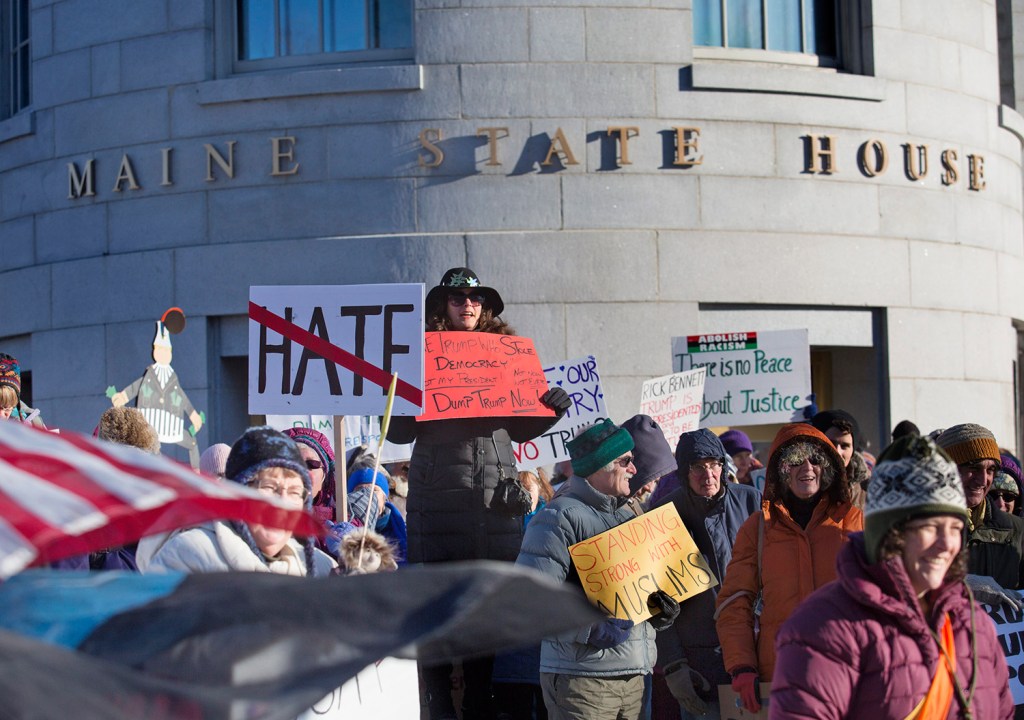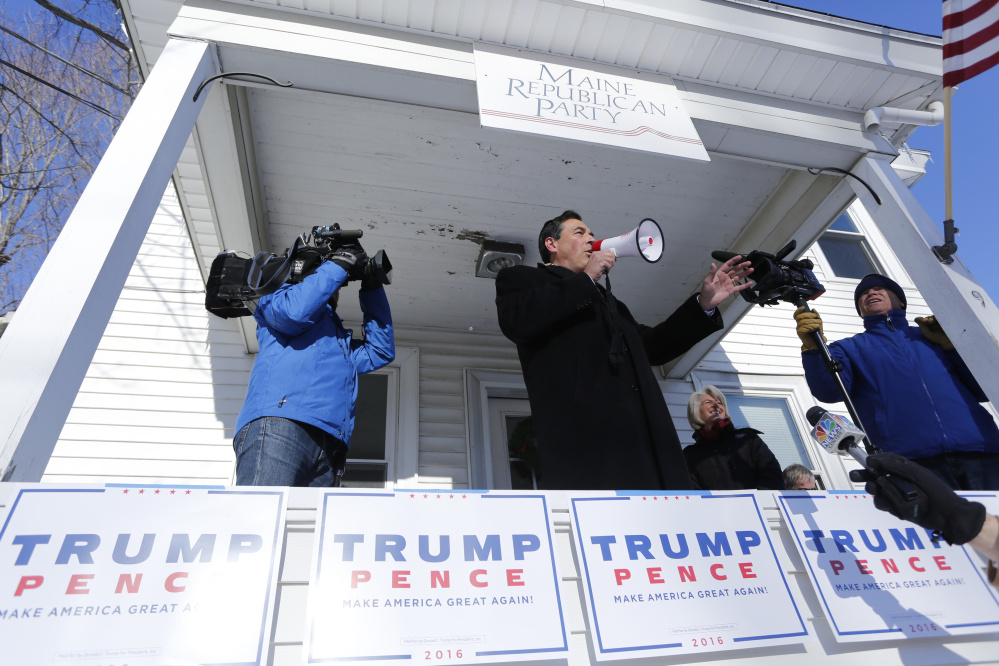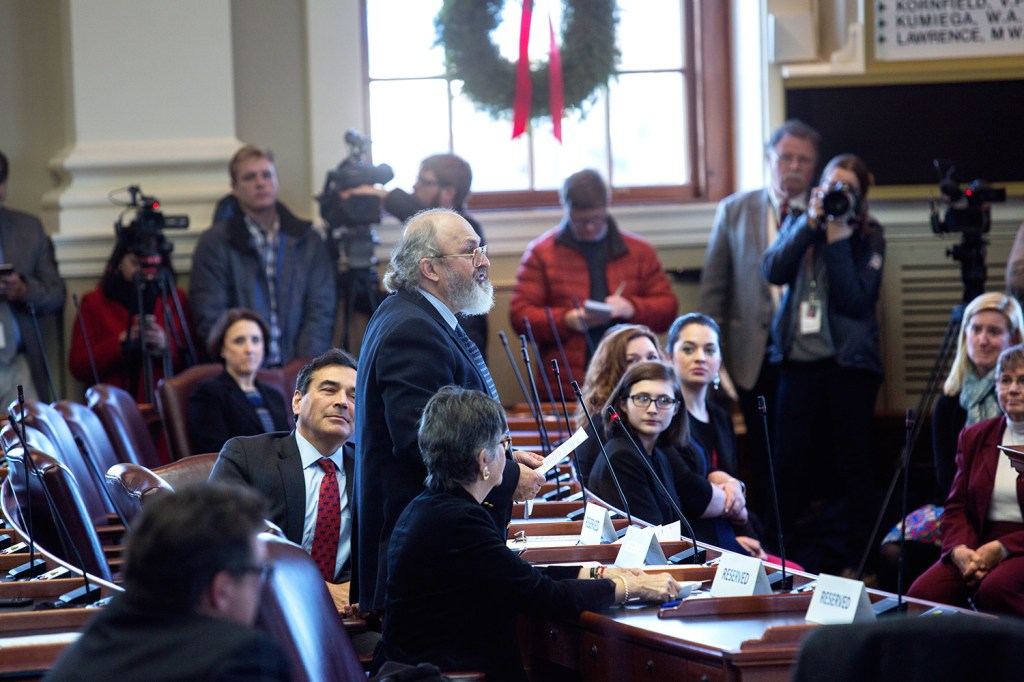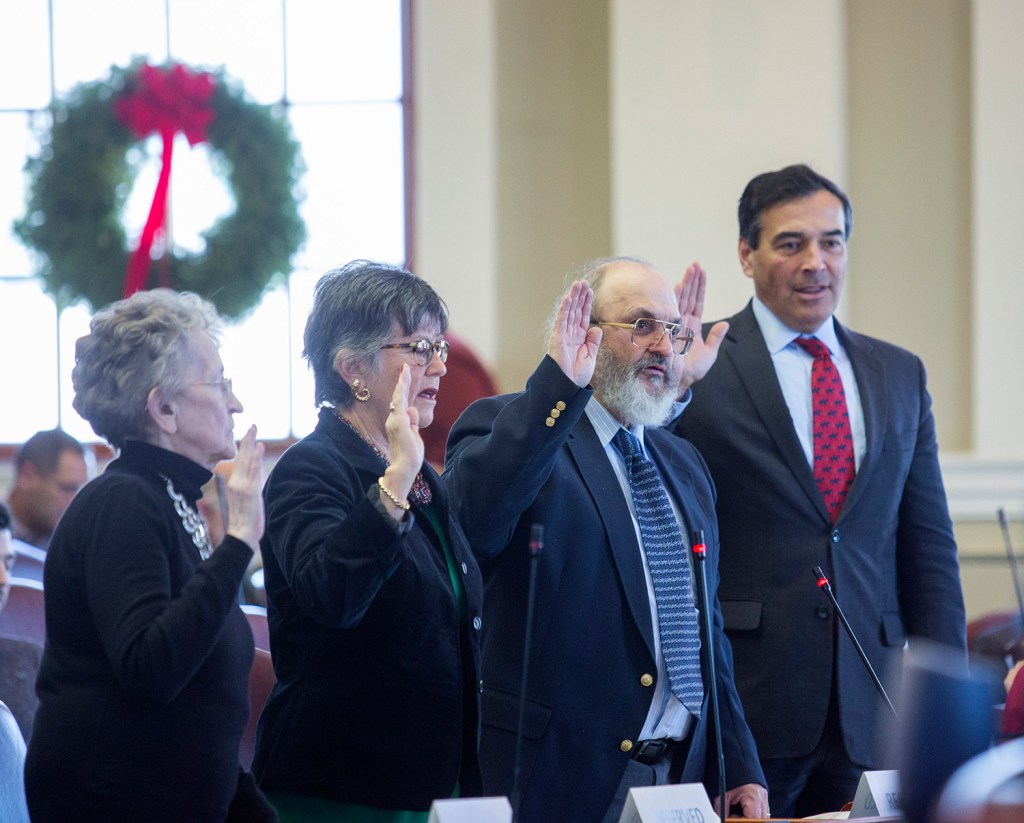AUGUSTA — Maine’s Electoral College electors cast three votes for Hillary Clinton and one for Donald Trump in a historic and unusual proceeding Monday that required a revote because one of the Democratic electors originally cast a protest vote for Bernie Sanders.
The initial vote by David Bright, a Democratic elector from Dixmont, was ruled out of order because he cast his ballot for the Vermont senator who won the Maine Democratic caucuses but lost the nomination to Clinton.
When the electors cast ballots a second time, Bright switched his vote and supported Clinton. And in a history-making split, Republican elector and Maine Republican Party Chairman Rick Bennett of Oxford cast his ballot for Trump.
The voting took place in the chamber of the House of Representatives after more than 300 people clustered outside the State House in bitterly cold weather, chanting and carrying signs.
The crowd included protesters who opposed the selection of Trump, as well as supporters of the Republican president-elect, who won 52 percent of the vote in Maine’s 2nd Congressional District, or about 37,000 votes more than Clinton.
Anti-Trump protesters, who were first on the scene, carried signs reading, “This is not the United States of Russia” and “Trump is unfit, unqualified, unscrupulous, unacceptable.”
HEATED PASSIONS ON A COLD DAY
Questions about Trump’s statements of support for Russian President Vladimir Putin during his campaign and possible Russian interference in the election to support Trump’s candidacy seemed to be on protesters’ minds.
Montress Kenniston of Kennebunk said it was worth standing in the cold to let Bennett and those supporting Trump know they were concerned about the future of American democracy and were still questioning the validity of Trump’s presidency.
“I’m concerned about our First Amendment rights so I’m going to exercise them as loudly and as often as I can and hope to keep them,” Kenniston said.
But Trump also had his supporters, who assembled at nearby Maine Republican Party headquarters and marched as a group with Bennett to the State House. The pro-Trump crowd also carried signs, including “Secure our borders.”
Police stood by as the anti-Trump crowd broke into chants of “He’s unfit! He’s unfit!” Trump’s supporters countered with chants of their own, loudly yelling “U.S.A.! U.S.A.!”
The protests in Maine were similar to those at state capitols around the country as electors gathered. According to the Associated Press, protesters also braved the cold Monday in Pennsylvania and held rallies in Colorado, Georgia, South Carolina, Virginia, Texas and Nebraska, among other states.
The final legislative action for Trump to become president takes place when Congress convenes on Jan. 6, 2017, to certify the Electoral College voting results, with outgoing Democratic Vice President Joe Biden expected to serve as the presiding officer as president of the U.S. Senate. Trump will be sworn into office at his official inauguration in Washington on Jan. 20.
After casting his ballot Monday at the State House, Bennett said the vote was not his but belonged to the thousands and thousands of voters in the 2nd Congressional District who selected Trump over Clinton.
“This is not a matter of personal conscience, it is not a matter of choice,” Bennett said. “It is a matter of oath and law.” He said his vote carried the hopes of district residents who felt they had been “forgotten or left behind by our political institutions.”
Diane Denk, a Democrat and elector from Kennebunk, said casting her ballot for Clinton was “bittersweet,” but she was still humbled and honored by being chosen as an elector.
“Today I have the privilege of voting, but the feeling is very hollow,” Denk said. “Having said this, it is time we stop looking back and start looking forward.” She hoped Trump would recognize the vast diversity in America and learn to accept and work with people whose views differ from his own.
Observing the voting were leaders of both parties, including House Speaker Sara Gideon, D-Freeport, and Senate President Mike Thibodeau, R-Winterport. Republican Gov. Paul LePage also was in attendance.
Gideon sat between the two Republicans, who at times have had strained relations. She and LePage were seen exchanging short comments and laughing at times in what appeared to be friendly conversations.
Earlier Monday, Bright said in a post on Facebook that he intended to cast his ballot for Sanders. Bright later told the Portland Press Herald that he wanted to do the right thing even if it appeared to be in conflict with Maine law requiring electors to cast their ballots based on the results of the popular vote.
“Maine also has a law that you’re not supposed to go faster than 70 on the interstate,” Bright said. “I suspect that I’m going to break that law on my trip to Augusta this morning, too.”
But after Bright cast his first ballot for Sanders, the president of the Electoral College, Betty Johnson of Lincolnville, ruled that his vote was out of order. Bright and the other electors were chosen by their political parties at state conventions.
Maine is one of 30 states with laws requiring electors to vote as pledged. According to the National Conference of State Legislatures, the consequence for violating these laws is often a fine, but no elector has ever been penalized or replaced.
Johnson, who also cast a vote for Clinton, was selected to replace Democratic elector Samuel Shapiro of Winslow, who was unable to attend Monday’s balloting.
Bright said he cast his first ballot for Sanders because he didn’t want young Sanders supporters to lose faith in their Democracy.
“The very least I can do is tell these new voters, ‘Look, somebody did listen to you. I want you to know that politics is hard, democracy is hard and messy. Sometimes you lose elections, but you need to stay in there,’ ” he said.
SENTIMENT FOR SANDERS LINGERS
Bright said he was voting for Sanders because he won Maine’s Democratic caucus and deserved at least one of Maine’s votes. He wrote that Sanders engaged many first-time voters, and he wanted to support their grassroots efforts.
“They organized, telephoned and sent in their $27,” Bright said, repeating some of the words in his Facebook post. “Many stood in line for hours in order to navigate our byzantine system of caucuses and convention this spring so they could be among the two-thirds of Maine Democrats who cast a vote for Sanders. Most importantly, they did this to vote for someone they believed in, not to vote against someone they feared.”
Maine and Nebraska are the only two states that allow a split of Electoral College votes by U.S. congressional districts.
The state last split its Electoral College votes 188 years ago. The state had nine electors in 1828, and eight cast their ballots for the National Republican Party’s candidate and incumbent John Quincy Adams. One elector voted for Andrew Jackson, the Democrat, who won the White House by carrying 15 states and 178 Electoral College votes.
Send questions/comments to the editors.













